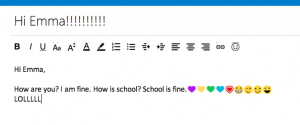 “May I have a cellphone?”
“May I have a cellphone?”
“Can I have a Facebook account?”
“My friends are going to the mall alone — can I go too?”
All of these requests have one thing in common: freedom. They are each small increments of freedom from parental control. In each case there are potential risks; they all imply a level of trust.
As parents, we need to make decisions about what our kids can handle, and balance them with the things that can go wrong — and right. And when parents ask my advice on what the right answers are for many of these things at different ages, I suggest one overall guideline:
Freedom is a privilege to be earned through the demonstration of consistent, good judgement and behaviour.
That means that the child who regularly gets his homework done without a fuss after dinner should probably be allowed to watch TV (or play a video game or whatever is agreed). The child who makes healthy choices should be allowed to pack her own lunch for school. The teenager who checks in regularly when she’s out with her friends, respects her curfew and answers her cellphone when you call may be ready for additional incremental steps of freedom.
Each freedom suggests its own rules: the cellphone must be kept charged and answered when you call. It can’t be used in school in violation of school rules. Usage can’t exceed agreed upon limits for talking and texting. They need to review their text messages with a parent from time to time.
The teen who wants to borrow the family car needs to follow the rules of the road, keep it clean and gassed up. Never drink and drive.
And so on.
What about when kids break the rules? Because that’s going to happen. Testing limits is part of growing up, after all.
When my kids break the rules, we discuss what it means. Usually, there is some backpedaling on their freedom for some time: the iPad that isn’t supposed to be used after lights out gets put back downstairs in the kitchen charging station where it used to go. The weekly Facebook page reviews with mom or dad that have fallen by the wayside become a part of our routines once again.
And as they demonstrate good judgement over time, we continue to offer back those increments of freedom and independence.
Yes, it does sound like common sense. Most parents practice this in one form or another. But the critical thing is to explain the underlying logic to your kids. They need to see the cause and effect logic in their behaviours and privileges.
They also need to understand that if we choose to let them go downtown alone with their friends (or go on a date, or walk to school by themselves), it’s because they’ve earned our trust over time.
And since you know your own kids, you can help decide when they are ready for the responsibilities that come with each freedom. One child may be able to handle her own Facebook account at 12; another may need to wait until they are older. There is no magic age when kids are ready.
Those freedoms aren’t doled out like random rewards — they are their due for playing by our rules.
 They may spend plenty of time on Tumblr, Snapchat and Instagram, but many of today’s kids are also learning to use digital technologies in responsible ways for creative, productive projects as well.
They may spend plenty of time on Tumblr, Snapchat and Instagram, but many of today’s kids are also learning to use digital technologies in responsible ways for creative, productive projects as well.


